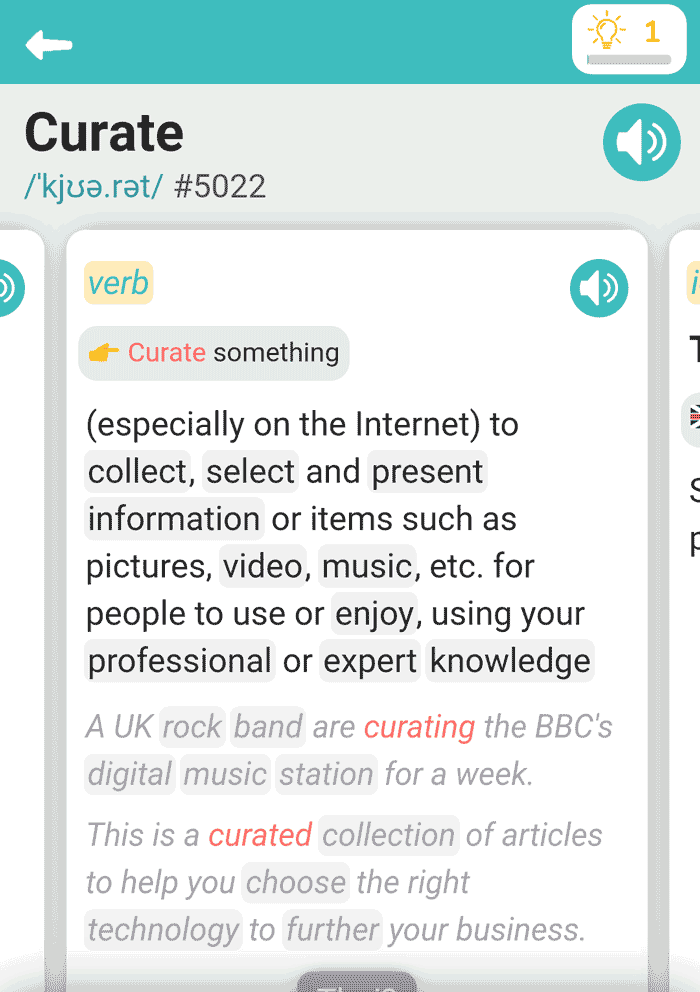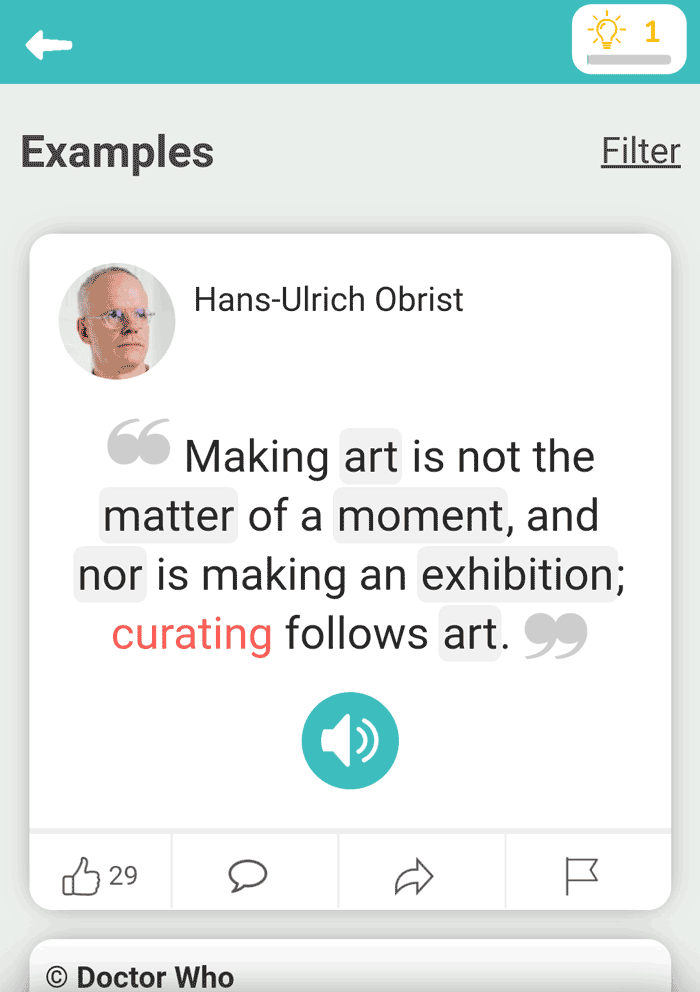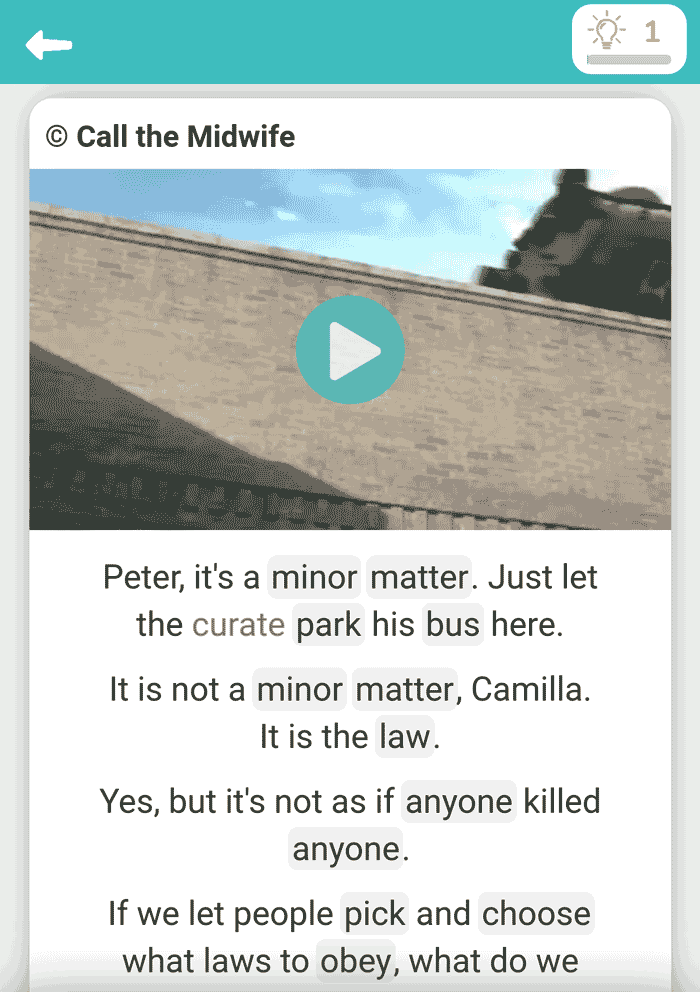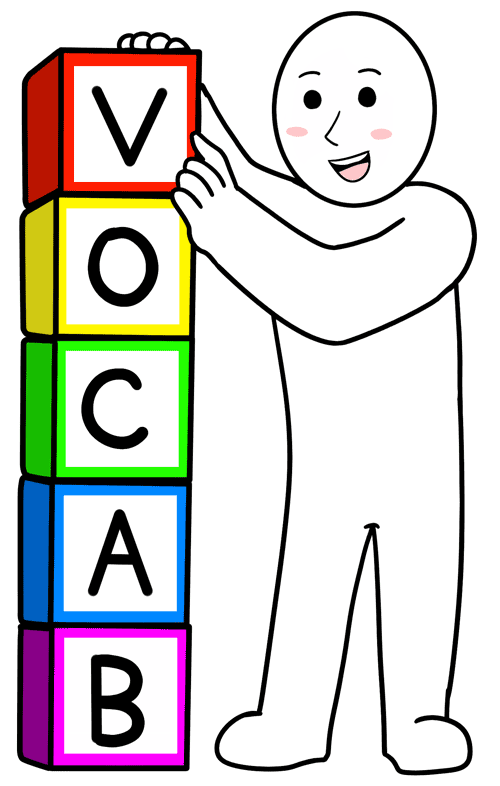
No one can deny it.
The size of your vocabulary matters.
Having a large vocabulary allows you to understand and communicate in English (almost) like a native.
So in this guide, you will learn 4 proven ways to increase your English vocabulary.
This guide will teach you:
- How to learn words deeply.
- How to increase vocabulary in a short time.
- How to expand your writing and speaking vocabulary.
- How to ensure you don’t forget words you learn.
Of course, if you want to accomplish these things, you need multiple methods.
Here are the 4 best ways to improving English vocabulary:
- Read and listen to English regularly
- Use vocabulary apps
- Imitate native speakers
- Prefer to use English over your native language
In this article, we’ll examine these strategies in great detail.
This guide is long. If you just want a summary of what to do, click here to jump to the step-by-step action plan.
Now let’s begin.
Method #1: Read and Listen to English Regularly

Reading and listening are the most powerful duo in English learning.
The key is to do it as much as possible. I recommend you do it during mindless activities like commuting to work or waiting at the airport. It’s a great way to turn boring activities into productive time.
You can read or listen to anything you want, but the best place is to start are things you find interesting. (For example, if you’re a fitness fanatic, you may read English books about exercise, diet, and nutrition.)
Or you can start with these two resources:
The Pros of Reading and Listening
Let’s look at the advantages of this method. (We’ll discuss the limitation later.)
Pro #1: It’s a powerful way to learn word usage
Some students learn English words by simply memorizing their meanings.
DISCUSS (dəˈskəs)
Talk about (something) with another person.
SECRET (ˈsēkrit, ˈsikrɪt)
Something that is kept unknown or unseen by others.
There’s a problem with this approach; it doesn’t tell you how to use words correctly in a sentence.
On the other hand, when you read or listen to English, you learn not just the meanings, but also how the words are used in a sentence.
We discussed the problem until 3 PM.
Leaning words in context (with surrounding words) like this is effective.
Suppose that presently you use the word ‘discuss’ incorrectly, so you tend to say, “discuss about (the topic),” instead of “discuss (the topic).”
How do you fix this mistake?
The answer is a lot of reading and listening. If you see and hear native speakers use the word discuss enough times, eventually you’ll get used to the correct usage, and “discuss something” will start to feel right while “discuss about something” will start to feel wrong.
Let’s look at another example.
Which of the two sentences below is correct?
- I’ll share the secrets to learn English vocabulary fast.
- I’ll share the secrets to learning English vocabulary fast.
This one confuses a lot of beginners. They tend to think the first one is correct because they believe the preposition ‘to’ cannot be followed by verb+ing.
But for advanced students who have seen and heard the word ‘secret’ in various instances, they know that the second sentence is the correct one.
Pro #2: It improves your English grammar

When you expose yourself to English, your brain is learning English grammar behind the scenes.
When you read a novel or listen to a story, the brain is learning things like:
- When to use certain English tenses.
- How to use prepositions (at, on, in, for, to).
English grammar is complicated and confusing, but the more you take in correct input, the better your grammar.
Pro #3: It improves your English comprehension
This one is obvious.
The more you read and listen, the better you understand written and spoken English.
Do you see why reading and listening are so powerful? They improve multiple aspects of your English at the same time.
The Limitation of Reading and Listening
When it comes to building vocabulary, reading and listening focus on quality, not quantity.
They are good at helping you learn words deeply, but not quickly.
Although they are powerful, it takes a long time to notice an improvement.
This is especially true for learners who already have a large vocabulary. Even if they read and listen a lot, they don’t come across unknown words very often.
This means if you want to learn a lot of new words in a short period of time, you need a faster approach like using vocabulary building apps.
Important Note to Advanced Learners
Although reading and listening are a slow way to build vocabulary, that doesn’t mean you shouldn’t do them.
It’s actually the opposite.
If your vocabulary level is quite advanced, listening and reading are a great way to deepen your understanding of the words you already know (so you can use them correctly in speaking and writing).
Even if you read something that contains only the words you know, it’s still beneficial because you get to see how those words are used.
Method #2: Learn English Words using Vocabulary Apps
Do you want to learn a lot of vocabulary in a short time?
Are you preparing for an upcoming English exam in which your vocabulary will be tested?
If so, say hello to vocabulary building apps.
Vocabulary apps are the most convenient way to learn English vocabulary. You can grab your phone and learn some new words almost anytime and anywhere.
Of all the vocab apps I’ve reviewed, the best one is WordUp.
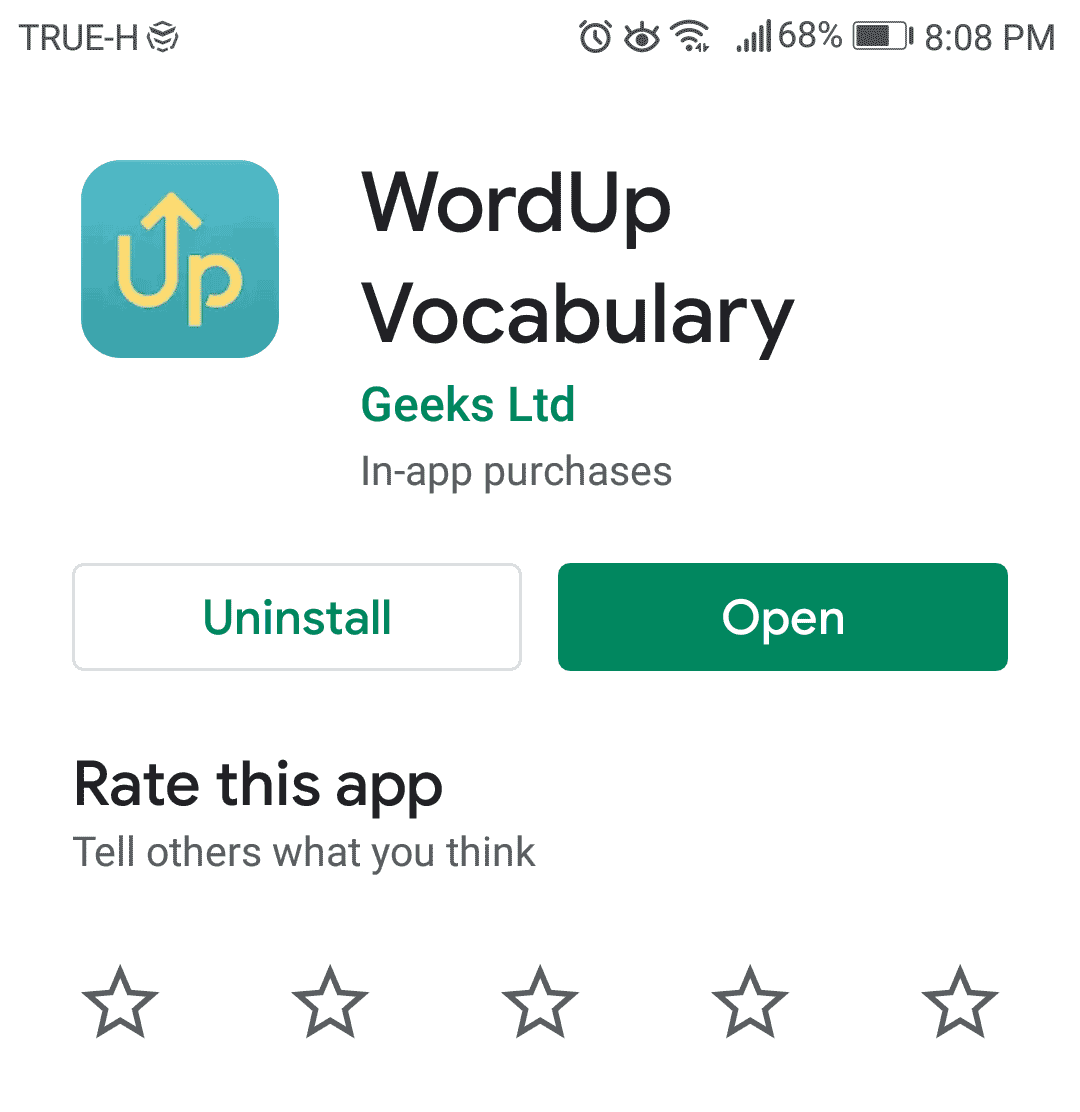
WordUp focuses on helping you learn English vocabulary deeply.
It accomplishes this by giving you a lot of usage examples.
In addition to word definitions, it shows video clips from movies and TV shows, songs, quotes, and news articles (lots of them).
Here are some screenshots:
By teaching words in context, with plenty of examples, it ensures that you’ll truly understand the words.
The app doesn’t have all the English words in the database (only the most frequently used ones). However, the number of words available is more than enough to keep you busy for a long time. Hopefully, they’ll add more words in the future.
There are many other vocabulary apps, but it’s hard to find one as good as WordUp. Some of the other apps show only one usage example for each word, or they show only one definition for multiple-meaning words.
So I only recommend WordUp for now. But feel free to try the other ones yourself.
If so, enter your email address to join my English speaking course:
Method #3: Imitate Native Speakers

Do you understand English well but are poor at speaking and/or writing?
Do you often have trouble finding the right words to use?
If so, you have a small active vocabulary.
Active vocabulary refers to the words that you’re able to use in speaking and writing, whereas passive vocabulary are words that you know but can’t use.
How do you expand active vocabulary?
Some teachers advise that you make sentences using the words that you want to turn into active vocabulary.
So if the target word is ‘resolve’ (to decide firmly on a course of action), you may write down something like, “After being diagnosed with diabetes, she resolved to stop eating sugar.”
This is a good way to build active vocabulary, right?
But there are two problems:
- What if you unintentionally use words incorrectly? (You can’t fix mistakes if you don’t know you’re making them.)
- It’s a bit tricky to use this method to build speaking vocabulary. (You have to get three things right: the word meaning, the correct usage, and the pronunciation.)
So I’d like to offer a different approach, which is imitating (copying) native speakers.
The strength of this practice is that it ensures you’re using words exactly like native speakers do (because you’re copying them).
There are two types of active vocabulary: writing and speaking vocabulary. Let’s discuss how to improve each of them using the Imitation practice.
How to Improve Your Writing Vocabulary
Are you bored with your own writing because you keep using to same words?
If so, you’ll love this writing practice.
The idea is simple: you read the writing of a native speaker, one sentence at a time. And without looking, try to write it down from memory.
This video demonstrates the process step-by-step:
Do you have a favorite English book? Pick a chapter and start copying.
Is there an English website that you read regularly? Pick an article from the site and start practicing!
The Imitation technique is not used only by language learners; it has been used by writers as well.
Some aspiring writers will take the works of their favorite writers and imitate them. This allows them to learn the writing style (word choice, sentence structure, etc.) of those accomplished writers.
In fact, a few famous people have also used this technique to improve their writing. In his autobiography, Benjamin Franklin wrote about how he taught himself to write better by copying the writing he admired.
How to Improve Your Speaking Vocabulary
The process is similar to the writing practice.
Here are the steps:
- Find a short audio or video clip in English (2 – 10 minutes long). (There are millions of them on YouTube.)
- Listen to the entire clip.
- Make sure that you understand everything.
- The clip should contain a lot of words and phrases you’ve never used in conversation.
- Play the clip again. This time, repeat after the speaker. When the speaker finishes a sentence, pause the clip and repeat the entire sentence.
- If a sentence contains a word or phrase you’ve never spoken out loud, you should repeat that sentence many times while thinking about the meaning of that sentence.
- Once you finish imitating the entire clip (or a part of it), try to express the main points or ideas on your own.
The last step (5th one) is crucial. During this step, you will NOT be able to recall the exact words. You will forget a lot things. You will struggle to speak.
And that’s a good thing!
Why? Because research shows that “struggle” enhances learning.
You can experience it yourself. Take a look at the following words; spend the same amount of time on each column.
| Column A | Column B |
| ocean / breeze | bread / b_tter |
| leaf / tree | music / lyrics |
| sweet / sour | sh_e / sock |
| movie / actress | phone / bo_k |
| gasoline / engine | river / b_at |
| school / college | pen_cil / paper |
| fruit / vegetable | be_r / wine |
| computer / chip | television / rad_o |
| chair / couch | l_nch / dinner |
Now, without looking, open a text editor (or grab a piece of paper) and write down as many of the words as you can.
From which column did you recall more words?
If you’re like most people, you remembered more of the words in column B. In fact, studies show you probably remembered three times as many!

Why is that?
When you saw a word with a blank space, you stopped (very briefly) to figure out what it was. That tiny bit of struggle made you remember.
This phenomenon has been replicated in many studies. When learning is easy, people tend to forget what they learn. But when there’s some difficultly involved, the knowledge sticks with them long term.
So if you really want to increase your speaking vocabulary, don’t just mindlessly repeat after the speaker word for word. It’s too easy.
You must struggle!
Method #4: Prefer to Use English over Your Native Language
Your brain is efficient. It’s constantly sweeping out unused memories to make room for new and frequently-used ones.
So if you don’t recall certain information for a while, you forget it.
If you don’t perform a specific skill for a while, it gets worse.

The same goes for your English vocabulary.
Without constant exposure to the language, you forget the meanings of some words.
If you don’t speak and write in English frequently, it becomes harder to find the right words. (Imitation practice can help with this.)
This is why you should add English to your daily routine so that English vocabulary stays fresh and active in your mind.
The idea is simple. If something can be done in either your native language or in English, choose to do it in English.
For example, if you want to search for information on how to do something, search for it in English.

If you take a lot of notes (reminders, shopping lists), take notes in English.
If you enjoy TV shows of your native country, switch to American or British TV shows.
If you’re addicted to social media, follow English pages and groups related to your interests. (And make a lot of comments in English.)
Change the language of your phone, all the apps, and everything else you can think of to English.
Do you write a diary? Record your thoughts and feelings in English.

These are just random examples. The actual things to do “in English” depend on your routine.
So take a look at the things you do each day. Can some to them be done using the English language?
Don’t think that this is trivial. Don’t underestimate this process.
It may seem to not make much difference in the short term, but the habit of preferring to do things in English will definitely improve your English vocabulary in the years to come.
Summary: Action Plan to Improve Your English Vocabulary
As you’ve learned, there are multiple ways to build vocabulary, each has different strengths and weaknesses.
It can be confusing to figure out when to use each of these methods.
So here’s a practical, step-by-step guideline:
Step 1: read/listen to English during mindless activities
We all have nonproductive activities that take up a lot of our precious time:
- Waiting for an appointment.
- Commuting.
- Lying in bed awake, waiting to feel sleepy.
This is the best time to read or listen to something in English.
The time you spend listening/reading should be at least 5 – 10 minutes long.
It takes time to fully shift your attention to something, so if the period is too short (like 2 – 3 minutes), that’s not enough time to fully concentrate on the material.
If you try to read or listen to something for just a few minutes, it will be hard to pay attention. You may see/hear the words but your mind will be occupied with something else.
Step 2: use vocabulary apps throughout the day
Our days are filled with hundreds of little moments:
- Standing in line.
- Waiting for the elevator.
- While the coffee is brewing.
- Pooping.

These moments are very short (usually less than 5 minutes)…too short to read or listen to something in English. This is when most people browse social media or text messages.
But not you! If you want to increase your vocabulary fast, this is the time to open a vocabulary app and learn a few English words.
Each time you do this, it may not seem like much (maybe you learn only 1 – 2 words). But if you do it throughout the day, the words begin to add up!
Adopt this habit. You’ll be surprised how much English vocabulary you can learn.
Step 3: if you want to build active vocabulary, practice Imitation
As you know, nowadays it’s not enough to just “understand” English. You mush be able to communicate in English too (and do it well).
To achieve this, you need to expand your speaking and/or writing vocabulary.
So I suggest practicing the Imitation technique for at least 15 minutes a day. It’s the best way to train yourself to use new words (in the correct way).
Whether you practice writing or speaking depends on which skill is more important to you at the moment. If both are equally important, you can alternate between the two, so one day you practice speaking, the next day you practice writing, and so on.
Step 4: use English instead of your native language whenever possible
You forget things that you don’t recall or use often, so using English regularly is essential.
Do your best to use more English in your daily routine.
Do you keep track of your appointments in a calendar app? Write down the details in English.
Do you often write down a list of things to buy? Make a list in English.
Sometimes, you may not know the English word for something, that’s okay. You can use the word in your native language instead. (Or better yet, you can search for that English word online. It’s super easy. No big deal.)
And that is all you need to know about improving your English vocabulary. You can adjust my suggestions as needed to suit your goals.
Thanks for reading. I hope you found this article useful.

